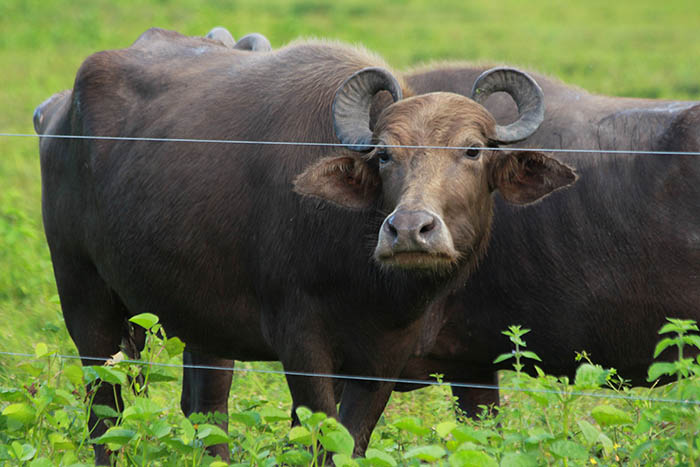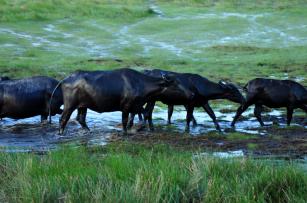Partnership between Brazil and India to ensure buffalo semen imports for Embrapa
Partnership between Brazil and India to ensure buffalo semen imports for Embrapa
Photo: Ronaldo Rosa

The Brazil-India partnership will facilitate semen imports for breeding and genetic improvement
In the upcoming months Brazil —more specifically the state of Pará— will receive hundreds of doses of semen of the buffalo breeds Murrah and Niili Ravi to improve the genetic quality of Pará herds. This was one of the victories of the Buffalo Breeding and Genetic Improvement Program with Innovation for the State of Pará (Promebull), led by Embrapa Eastern Amazon, after a mission in India conducted in January.
The report and the results of the mission of technical cooperation with India for the management and genetic improvement of family dairy Buffalo farming in Pará state were presented this Friday morning (Feb 8) at the headquarters of the Pará State Agricultural Federation (Faepa), for representatives of the local Buffalo chain.
Pará concentrates the largest buffalo herd of Brazil, exceeding 600,000 head, according to data from the Pará State Agricultural Defense Agency (AdePará).
The Embrapa researcher, Ribamar Marques, leader of the mission, explained that India is the cradle of the world's buffalo farming and place of origin of the species. He stated that the partnership between the countries is going to not only promote a leap in the genetic quality of state herds, but also the exchange of technologies for the benefit of the whole chain. The best females selected among Promebull's partner breeders in the state will be inseminated with the semen of superior males from India, to generate offspring that are more productive in meat and milk. And the best steers and heifers generated through this partnership will be monitored and be future donors of genetic material, ensuring the constant improvement of the herds and Promebull's sustainability, emphasized the researcher.
One of the project's highlights that guaranteed India's acceptance of the agreement was Promebull's social nature and democratization in Marajó, one of the regions that have the lowest development indicators in the Brazil, as it mostly focused on family-based dairy farming, ranging from smallholders, with few animals, to mid-sized and large holdings. What determines the partnership is the quality of the females to be inseminated and we have already had successful experiences with breeders whose herds amount to less than 20 head, Marques commented.
As a member of the board of one of the project partners, Faepa, the animal scientist Guilherme Minssen also participated in the mission and evaluated it as extremely successful. The Faepa director observes that the Brazil-India partnership is going to accelerate the expansion of the chain and that the federation will work with unions to strengthen Promebull in the whole state
Project fulfils farmers' needs
“This has been an over two-decade long wait and it is going to help to change reality in Marajó [island]", celebrated the president of the Pará Association of Buffalo Breeders, Roberto Fonseca. The current average milk production in the archipelago amounts to around 2 l/day per cow, and with the genetic improvement and correct management, it could reach 14 l, as Fonseca remarked. By selling the liter for an average R$ 5, small-scale dairy farmers will increase their income, the quality of life of their families and also inject money in the region. It is a chain of social and economic benefits, the president of the association raises prospects.
About Promebull: the Program of Buffalo Genetic Improvement with Innovation for Pará State (Promebull) is performed by Embrapa Eastern Amazon in partnership with the Pará Federation of Agriculture and Livestock (Faepa), and State Secretariat of the Agricultural Development and Fisheries (Sedap), with the goal of improving the economic indicators of job and income for family-based dairy buffalo farming, through genetic improvement and best practices in management, animal feed and animal health. The project was initiated by Embrapa in 2015, and in April 2018 it became a government program through an agreement with Sedap. Thus the actions that were exclusive to Marajó will start to encompass other regions of Pará.
Translation: Mariana Medeiros
Kélem Cabral (MTb 1981/PA)
Embrapa Eastern Amazon
Press inquiries
amazonia-oriental.imprensa@embrapa
Phone number: +55 91 3204-1099
Further information on the topic
Citizen Attention Service (SAC)
www.embrapa.br/contact-us/sac/

